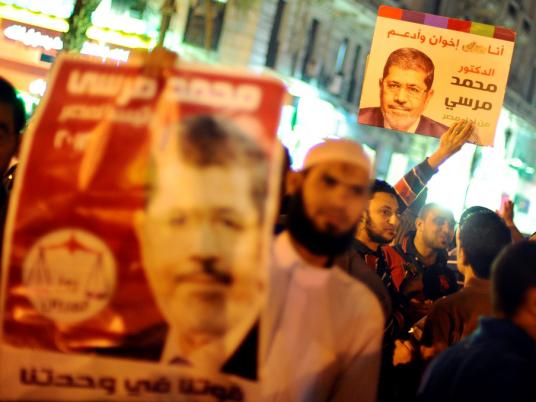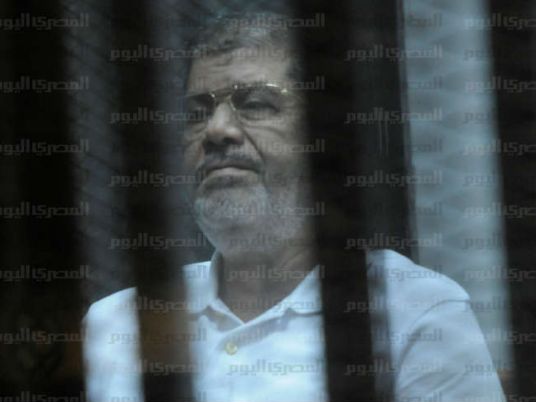
As violence continues between the president’s backers and detractors on the street and the rift deepens between Islamist and secular political elites, the debate flares up over the way out of deadlock that portends civil strife and the potential re-entry of the military generals into politics.
On Sunday, clashes between the Muslim Brotherhood’s supporters and opponents entered their third day. The violence came on the heels of President Mohamed Morsy’s issuing of a constitutional decree that granted him sweeping powers and effectively tightened the Brotherhood’s grip on Egypt’s politics. Eventually, thousands took to the streets nationwide, clashes erupted in several provinces, and many of the Brotherhood’s headquarters were attacked.
A controversial declaration
For secularists, the abolition of the decree stands as the only resolution to the ongoing turmoil. “Egypt is moving towards a point beyond fixing,” said Amr Hamzawy, a political scientist and leader of Egypt Freedom party. “Our stance is clear and there is no room for maneuvering.”
“We decided not to hold any talks [with the president or his party] before this declaration is abrogated,” he added.
On Thursday, Morsy dropped a bombshell by passing a seven-article constitutional declaration that deemed all his decrees and laws immune from appeal or cancellation. The declaration denied the Supreme Constitutional Court the right to rule over the constitutionality of the Islamist-dominated Parliament’s upper house — known as the Shura Council — or the Constituent Assembly, tasked with writing the constitution. Further, Morsy granted himself the exclusive right to take any measures he sees fit to protect the country's “national unity, national security and the revolution.” Additionally, Morsy sacked the prosecutor general and appointed a new one.
While pro-democracy groups insist that this charter sanctifies presidential despotism, Islamists contend the president will hold such exceptional powers only for another two months until the new constitution is passed. Moreover, they describe Morsy's move as essential.
“The only way out is to get done with the constitution as soon as possible and set it to public referendum,” said Amr Darrag, a Freedom and Justice Party leader and the secretary general of the Constituent Assembly. “This is the only way we can end the current exceptional situation.”
Since Morsy issued this declaration, FJP and Muslim Brotherhood leaders have argued that the president had to claim these powers in order to counter a “politicized” judiciary that seeks to dissolve all elected bodies and halt the drafting of the constitution.
The Supreme Constitutional Court was yet to rule over the constitutionality of the Shura Council and the Constituent Assembly. Islamists feared the court would dissolve both bodies, as it did with the Parliament’s lower house in June.
“If these [dissolution] verdicts are handed down, we will be left only with a president, and without a Parliament or a Constituent Assembly,” said Darrag.
“It is such a situation that could lead to the return of the generals. This declaration aims at safeguarding against the return of the generals,” he said in response to pundits contending that the current turmoil could entice the military to take over.
But regardless of Morsy’s attempt to safeguard the Constituent Assembly, the assembly itself has been on the edge of disintegration.
Earlier this month, major church representatives, along with key secular figures, withdrew from the assembly contending that Islamists seek to pass the constitution hastily and without serious debate. Earlier, Christians and secularists were alarmed by the Islamic references that the Brothers and Salafis sought to include.
These resignations occurred at a critical moment, as the assembly’s mandate was expected to expire in December. However, Morsy’s decree gave the constitution’s architects another two months to resolve their differences. Yet, these two months would not necessarily bridge the gap between the two camps.
After Morsy’s decree, more secularists withdrew, including Ghad al-Thawra Party leader Ayman Nour.
However, this failure to build a consensus around Egypt’s first post-revolution constitution does not seem to bother the Brothers.
“Nobody expected a 100 percent agreement on the constitution. If these [withdrawing] forces choose to disrupt the assembly, let them bear the responsibility of this move and the people can hold them accountable for that,” said Darrag.
The resulting dilemma
More violence was expected to ensue on Tuesday as both the Brothers and their detractors have called for million-strong rallies. Opposition protesters are set to rally in Tahrir Square, and the Brothers had initially announced that they would demonstrate in Abdeen Square, a few kilometers away. However, they later decided to move their demonstration to the front of the Renaissance Statue in Giza to show support for Morsy’s decision.
Amr Abdel Rahman, a political science researcher at Essex University, believes the military must have intervened discretely to convince the Brothers not to rally near their opponents.
“From a security perspective, the military must be worried that the Brothers will take to the streets on Tuesday,” said Abdel Rahman, who expects the generals to intervene further until Morsy resolves the ongoing deadlock.
“I expect the military to intervene informally and behind the scenes … in order to convince Morsy to find a way out,” added Abdel Rahman.
In an attempt to bridge the gap with judges, Morsy called for a meeting with representatives of the Supreme Judicial Council on Monday to discuss his latest decree.
"I believe [the Brothers] have realized the magnitude of the crisis because of what is happening in [Tahrir Square], the attacks on their headquarters, the judges' sit-in and strike, and international reactions,” Ammar Ali Hassan, a political commentator, told Egypt Independent.
On Saturday, thousands of judges convened and decided to go on strike to protest Morsy’s declaration. Earlier, the US government and the European Union voiced concerns over Morsy’s decisions.
"The split in the street is quite dangerous and the constitutional declaration paves the way for a continuous conflict and violent clashes,” said Hassan, who expects Morsy to renege on the decree.
If Hassan’s expectation is fulfilled, it will be the fourth time Morsy has reversed a major decision since taking office. In June, Morsy first refused to be sworn in before the Supreme Constitutional Court and insisted on taking the oath before Parliament. This was seen as defying the court, which had just dissolved the Islamist-dominated People’s Assembly.
When judges held that taking the oath in Parliament would be invalid, Morsy changed his mind.
A few weeks later, Morsy had to renege on his decree to reinstate Parliament after the Supreme Constitutional Court ruled that his move was invalid. Then the Judges Club gave him 36 hours to apologize for violating a court verdict.
And last month, the president had to go back on his decision to dismiss former Prosecutor General Abdel Meguid Mahmoud, as judges insisted he had no right to dismiss members of the judiciary.
“This time, Morsy will try to find a way out that can save face,” said Hassan.
“Political forces should provide him a safe exit from this crisis by agreeing to hold negotiations on certain articles,” he added.
While he insists Morsy should relent on the declaration’s articles protecting his decisions against appeals and granting the Shura Council and Constituent Assembly immunity against dissolution, Hassan says secular groups could agree with the president on keeping certain clauses, such as the one to retry those convicted of killing anti-government protesters during the 25 January uprising.
In a presidential statement on Sunday afternoon, and in what some deem a conciliatory attempt, Morsy vowed to establish a democratic dialogue with different political forces to establish consensus on the constitution.
A potential victory
However, Abdel Rahman ruled out that Morsy could make any concessions on Parliament or the Constituent Assembly. “If he goes back on that, he will have serious problems with the Brothers and his image will be seriously harmed.”
The only concession Morsy could make is to refrain from enforcing articles that grant him the right to make any decisions that he deems fit in the future, Abdel Rahman contends.
Since the declaration was passed, pro-democracy groups have voiced fears that these clauses could be used by Morsy and the Brotherhood to harass their opponents and crack down on the media.
Meanwhile, rumors have circulated that the regime is building up cases against the opposition on grounds of seeking to “overthrow” the government. If Morsy pledges not to take any of these measures, he may contain public outrage, according to Abdel Rahman.
Morsy could also pass an explanatory memorandum stipulating that any decision he makes going forward — other than the immunization of the Constituent Assembly and Shura Council, and the sacking of the prosecutor general — can be appealed in court, added Abdel Rahman.
Although these particular decisions seem to be the main bone of contention, Abdel Rahman held that Morsy could still get away with them.
He contended that the judges’ opposition is not strong enough. “The standoff with [the] judges is not fierce. A small number of courts have gone on strike,” he said.
Besides, Morsy could bet on time, waiting until Tahrir protesters are tired, added Abdel Rahman.
“The most important thing is that [Morsy] prevents clashes between the Brothers and their opponents and to avoid any oppressive measures against the media and the opposition,” he said.
It is unclear if Morsy can dissuade the Brothers from taking to the streets on Tuesday.

